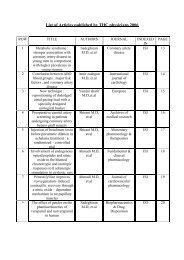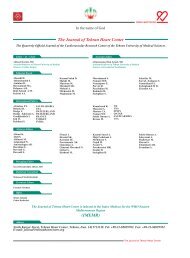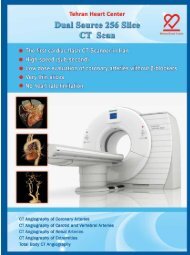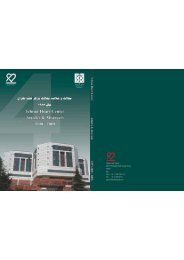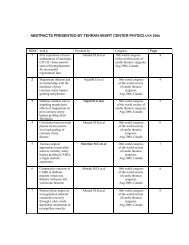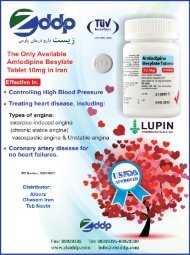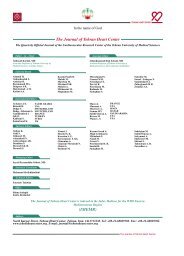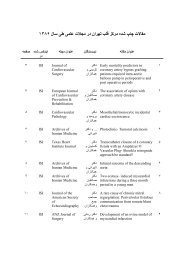Metabolic Syndrome: Stronger association With Coronary Artery
Metabolic Syndrome: Stronger association With Coronary Artery
Metabolic Syndrome: Stronger association With Coronary Artery
You also want an ePaper? Increase the reach of your titles
YUMPU automatically turns print PDFs into web optimized ePapers that Google loves.
Original Article<br />
Predictors of Long-term Outcome in Patients with Acute <strong>Coronary</strong><br />
<strong>Syndrome</strong> Undergoing Percutaneous <strong>Coronary</strong> Intervention:<br />
A single center registry (THCR)<br />
Seyed Ebrahim Kassaian, MD 1* , Mohammad Sahebjam, MD 1 , Mojtaba Salarifar, MD 1 ,<br />
Mohammad Alidoosti, MD 1 , Alimohammad Haji Zeinali, MD 1 ,<br />
Davood Kazemi Saleh, MD 2 , Hamidreza Poorhoseini, MD 1 , Navid Paydari, MD 1 ,<br />
Gholamreza Davoodi, MD 1 , Mehran Mahmoodian, MD 1 , Seyed Hesameddin Abbasi, MD 1<br />
1<br />
Tehran Heart Center, Tehran University of Medical Sciences, Tehran, Iran.<br />
2<br />
Baghiatallah Hospital, Baghiatallah University of Medical Sciences, Tehran, Iran.<br />
Abstract<br />
Received 30 August 2006; Accepted 19 December 2006<br />
Background: This study sought to access differences in long-term (9 months) outcomes between Acute <strong>Coronary</strong> <strong>Syndrome</strong><br />
(ACS) patients who undergo early intervention compared to Percutaneous <strong>Coronary</strong> Intervention (PCI) in stable and<br />
refractory conditions.<br />
Methods: Data originated from Tehran Heart Center Registry- interventional cardiology (THCR-IC) and consisted of<br />
1267 patients divided into two categories; 227 patients had features corresponding to acute coronary syndromes (17.9%) and<br />
1040 patients suffered from stable angina (82.1%). They were admitted between April 3, 2003 and April 25, 2004.<br />
Results: The clinical success rate of PCI was higher in ACS (97% vs. 94%; P=0.037), while In-hospital complications<br />
were similar in both groups. During the follow-up period, clinical restenosis was not significantly different and the overall<br />
number of re-interventions caused by restenosis or progression was not more frequent in ACS patients. Also, 1.3% of ACS and<br />
0.4% of SA patients died, but the difference was not statistically significant (P=0.16). Finally, Major Adverse Cardiac Events<br />
(MACE) showed no significant difference (5.2% vs. 3.9%; P=0.42). Multivariate analysis showed that female sex (OR=25.6;<br />
P=0.003) and previous history of PCI (OR=8.4; P=0.016) were the only strong independent risk factors for major adverse<br />
cardiac events. Analyzing ACS patient outcomes using Mantel-Hanzel analysis showed that the female sex was the only factor<br />
which strongly increased the incidence of MACE.<br />
Conclusion: Both ACS and SA patients who underwent coronary intervention had similar in-hospital and composite major<br />
adverse cardiac events, nevertheless female gender must be considered as an independent risk factor for major adverse<br />
cardiac events especially in patients with acute coronary syndrome who undergo PCI.<br />
The Journal of Tehran Heart Center 3 (2006) 155-161<br />
Introduction<br />
Keywords: Acute coronary syndrome • PCI • Outcome<br />
Patients with Acute <strong>Coronary</strong> <strong>Syndrome</strong>s are at risk for<br />
adverse cardiac events.1 In a patient with unstable angina,<br />
the risk of acute myocardial infarction or death is high: 20%<br />
of patients within 30 days after the onset of symptoms and<br />
25% in 6 months.2 Mortality in this group of patients varies<br />
from 1.5 to 2.5 after six weeks to 7-10% after a year.3 The<br />
*<br />
Corresponding author: Seyed Ebrahim Kassaian, Assistant Professor of Cardiology, Tehran University of Medical Sciences, Tehran Heart Center,<br />
North Kargar Street, Tehran, Iran. 1411713138. Tel: +98 21 88029257. Fax: +98 21 88029256. E-mail: ekassaian@yahoo.com.<br />
The Journal of Tehran Heart Center<br />
155



